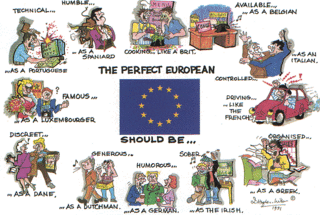 I was listening to WAKY radio on my way to work today. WAKY is a highly duh!mericanised radio in Luxembourg which gives us the best of CNN news every hour or so. It is the kind of radio that puts baseball and basketball at the top of its sports news and the only time you hear anything about Il Campionato, the Championship or La Liga is at the start of the year or at the end. It is a small wonder how it is still one of my preset stations in fact. What WAKY does have is a good music selection. It is definitely non-selective and plays German, Italian, French, English and (American) music in a balanced manner. This morning, for example, I enjoyed a humouristic Italian rap song about Federica, full of puns and double-entendres about the pleasures of masturbation. I wondered how many listeners in the good old Duchy could really understand that this Italian rapper was really glorifying the features of his five-fingered friend� "Federica la mano amica".
I was listening to WAKY radio on my way to work today. WAKY is a highly duh!mericanised radio in Luxembourg which gives us the best of CNN news every hour or so. It is the kind of radio that puts baseball and basketball at the top of its sports news and the only time you hear anything about Il Campionato, the Championship or La Liga is at the start of the year or at the end. It is a small wonder how it is still one of my preset stations in fact. What WAKY does have is a good music selection. It is definitely non-selective and plays German, Italian, French, English and (American) music in a balanced manner. This morning, for example, I enjoyed a humouristic Italian rap song about Federica, full of puns and double-entendres about the pleasures of masturbation. I wondered how many listeners in the good old Duchy could really understand that this Italian rapper was really glorifying the features of his five-fingered friend� "Federica la mano amica".This set me thinking (in my own perverted serendipitous way of thinking) about the true European once again. I have written before about Europe's need to find itself in this time of crisis. More importantly I have referred to the need to define its base before setting off on a renewed project. The basic question remains the citizen. Who is the European citizen? What does he want to achieve? What tools does he need?
The Acquis Communautaire that is currently under crisis management was built on the foundation of peace and general well-being. The basic premise of the founding-fathers was that a group of nations that mutually benefit each other economically would no longer find any reason to enter into periodical blood-baths. Thus the common market. With the common market came the four freedoms � goods, services, persons and capital. The rights and freedoms which the European Community brought to its demos where economically oriented � the freedom to move for persons, for their capital, their goods and the services that they provide. Movement is what Europe was to be built on.
Which is why at times it is difficult to get the citizen to understand the basics of Europe and its Union. We have to picture the businessman on the move benefiting from Schengen while shifting his capital investments or his goods from one country to another. The proletariat could not feel the benefits Europe was bringing it. Who could explain in simple terms the ground-breaking decisions of the court relating to the Direct Effect of regulations? Was it not easier to describe the EU developments as some monster in Brussels always wanting more and giving less?
The people were most frustrated when things stopped working. By things I mean national economies and their slowdown. I mean employment levels. I mean cost of living. They then tried to put their finger on the culprits and found a mess of representation that they could not understand.
Back to the main question. How do we define today's European? Do we still need the movements as a basis? Can I be European and be lazy and not need to move? Do I need a European element to be able to fall under this immense project? What if I stay in my little village all my life? Can I still be European? Do we need to devise a sense of belonging? A sense of acceptance? A oneness? Or a plurality that accepts its collective goal? Once again another blog with many questions and no answers. However I do believe that asking the questions is a good start!
Id-dinja mistoqsija....




Aucun commentaire:
Enregistrer un commentaire